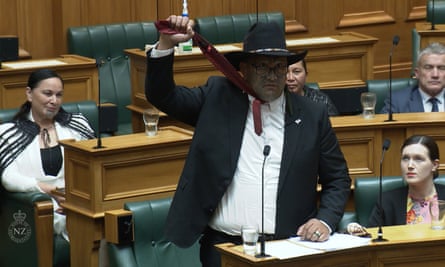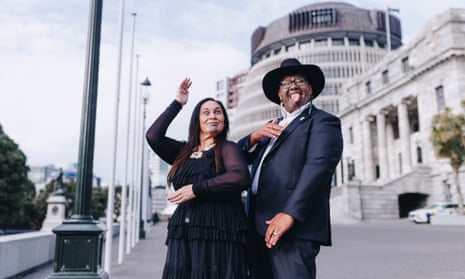Rawiri Waititi and Debbie Ngarewa-Packer sit down laughing. He holds a glass with a thick finger of whisky, she a handful of cheese sticks. Asked if they’re celebrating, Waititi chuckles: no. If anything, they say, it’s the small victory of getting through a Wednesday in parliament. Their office is hung with a striking red and black painting. “We will not be silenced,” it reads. “We will not be assimilated.”
The pair seem in good spirits, and with reason. The party has undergone a fairly radical change in fortunes. In 2017, after three terms spent in government as part of a confidence and supply coalition with National, it failed to win a seat or send a representative into parliament – a result most commentators read as punishment from voters for years spent compromising with a centre-right government. It’s a fate small parties rarely recover from. “Every political pundit, every political algorithm said we were goneskies,” says Waititi. Against the odds, the party won back a seat from a wave of Labour victories in the last election, with fresh leadership promising an unapologetic voice for Maori. Asked for their greatest achievements of the last term, making it back is the first thing they cite.
Now, Te Pati Māori has more than survival in its sights. Election year is approaching, and it seems increasingly likely the party could hold the balance of power in New Zealand’s next government. At least four recent polls have placed the party as king-makers in a closely matched contest between New Zealand’s left and right. The next election could deal Te Pati Māori a winning hand, but it’s not yet clear how they’d like to play it.

In parliament, the pair have demonstrated a gift for grabbing headlines, and a lack of interest in compromising, whether on attire, parliamentary conduct or policy. After his election in 2020, Waititi refused to swear the traditional oath to the Queen without first swearing allegiance to the Treaty of Waitangi. His refusal to wear a necktie – which he dubbed a “colonial noose” – saw him ejected from the house for breaching dress codes. In another brief controversy, the leader of the Act party questioned whether Waititi’s Air Jordan sneakers met “business attire” requirements, and the Speaker commented that, growing up, he believed they were the attire of drug dealers. The pair were ejected again after Waititi stood to call the opposition’s rhetoric racist; asked to sit down by the Speaker, he and Ngarewa-Packer performed a haka.
Ngarewa-Packer and Waititi see those conflicts not as incidental to their presence in parliament, but a central part of their mission, listing them among their key achievements. “The tie is not about the tie,” says Waititi. “This is about cultural representation, cultural identity.” Ngarewa-Packer nods. “It’s taken a long time to be able to assert our own pathway in this house,” she says. The conflicts also serve to illustrate a deeper challenge – a party both constantly at odds with the colonial parliament’s status quo, and a component part of its machinery.
The challenge of moving from protest party to government
“I think the chances of Te Pati Māori being a big player in what I think will be a close election are high,” Māori political commentator Shane te Pou said. The question of what they do with that, he says, is thedifficulty: it’s much harder to maintain an oppositional identity as gadfly on the steed of state, after you become the steed.
“You get things done by being either in coalition or in government. You don’t get things done by being a protest wing of parliament,” Te Pou says. “You can be a protester, but at the end of the day you want runs on the board.”

So far, being the protest wing has suited the party, who pull no punches in loudly decrying policy where they believe it fails Māori – at times to the anger of other parties. When the government made a shift to Covid policies that experts believed would lead to higher infection rates, Waititi called it “squid games for Māori,” referring to the popular Korean television show where indebted competitors are killed off for the amusement of watching elites. “We’ve been really – I can’t think of a better term, but – unapologetic in every policy setting and legislative space that we can,” Ngarewa Packer says. “We will continue to hold the government to task. And on the other side, we also turn to our right and our left and have to hold opposition to task.”
Shifting from that oppositional stance to one of coalition governance – a position usually marked by compromise and concessions – could be a challenge for the party and its base.
“It would require a total change in the way that they approach parliamentary politics,” says Ben Thomas, political commentator and former National government adviser to Chris Finlayson, minister for Treaty negotiations. “If you want to be a fully kaupapa-Māori political party, how do you work with the colonial government?” he says. “It’s always going to be difficult to reconcile.”
The next election could place the party’s leadership in their strongest-yet position to extract policy concessions. But they have a far broader target in mind: a total reform of New Zealand’s constitutional framework. Their top priority is a “Te Tiriti-centric Aotearoa” – changing New Zealand’s governance at a system-wide level to be based on the Treaty of Waitangi, which guarantees Māori “unqualified exercise of their chieftainship” over their lands and resources. Waititi has said the current form of “one person one vote” democracy does not reflect the core of the treaty, which assures self-determination to Māori. The party has its policy platform, Waititi and Ngarewa Packer emphasise – eradicating GST on food, opposing deep sea drilling, expanding funding to the Māori health authority, ending homelessness for Māori. But Waititi also seems to see those policies as small fry.
“Policies come and go, problems come and go. Governments come and go. It’s like the haka: ka mate ka mate, ka ora, ka ora [it is life; it is death],” he says.
“Just like the waves hitting the shores, it goes in and out all the time. What doesn’t change is parliament. Parliament doesn’t change, and this is what upholds the systemic racism that continuously puts our people in second place. So until that changes, what are policies?”
